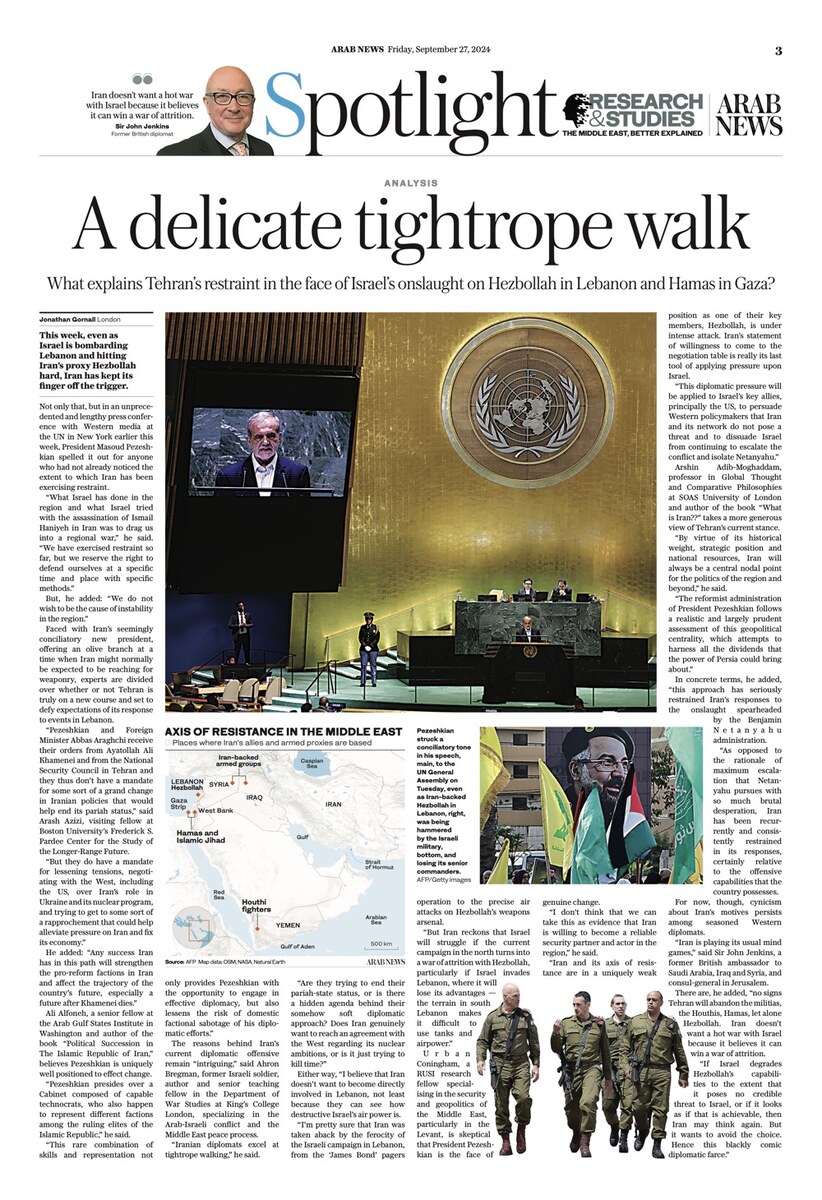LONDON: On July 31, Ismail Haniyeh, the head of Hamas’ decision-making Political Bureau, was killed in the heart of Tehran.
As a prominent negotiator of an eagerly awaited ceasefire deal with Israel, Haniyeh would have made an unlikely target for an Israeli government looking to bring an end to the months of indiscriminate death and destruction being suffered in Gaza.
However, for Israeli Prime Minister Benjamin Netanyahu, whom critics accuse of maintaining the impetus of perpetual war as a guarantee of clinging on to power, the audacious killing appeared to be a calculated provocation of Tehran, designed to escalate the war in Gaza into a regional conflict.
According to this line of thinking, other than vowing to avenge Haniyeh for the “cowardly action,” Tehran refused to play ball.
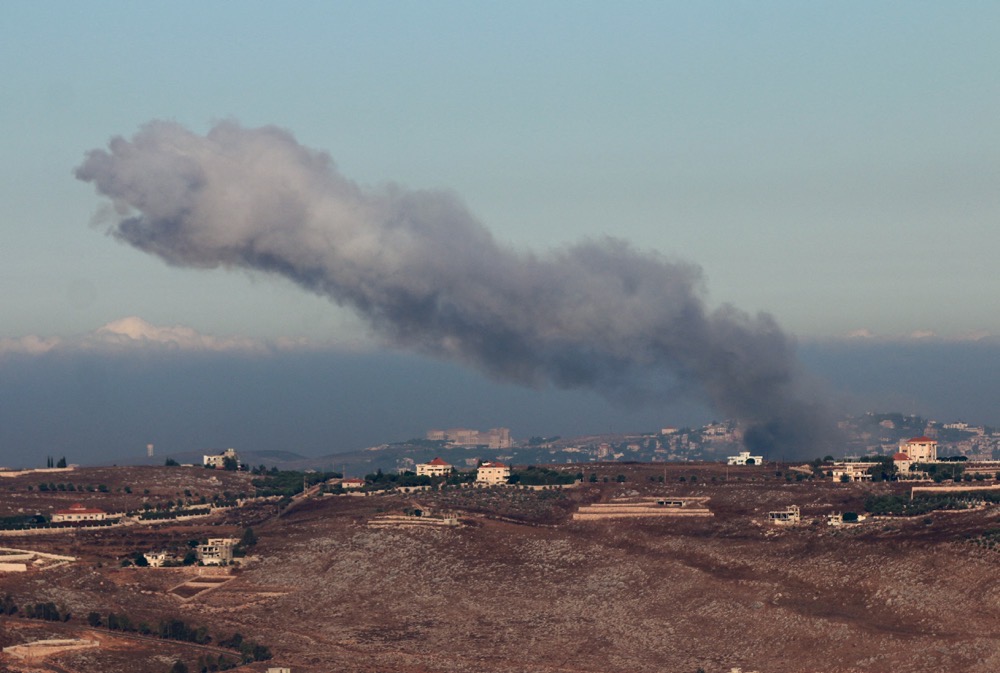
Israel’s “desperate barbarism” in Lebanon, Pezeshkian said, must be halted “before it engulfs the region and the world.” (Reuters)
In much the same way, Iran’s reaction to the Israeli missile attack on an Iranian diplomatic mission in Damascus in April, in which senior members of the Islamic Revolutionary Guard Corps were killed, was unexpectedly muted. Iran’s response — a wave of missiles and drones that constituted its first direct attack on Israeli soil — was largely gestural, planned, telegraphed and executed deliberately to cause minimum damage and casualties.
This week, following the deadly pager-bomb attacks — widely believed to be carried out by Israel’s spy agency Mossad targeting Hezbollah operatives — and airstrikes, as Israeli troops massed on the border with Lebanon, critics said Netanyahu was poised once again to try to provoke Iran into a regional escalation.
And, once again, Tehran is exercising restraint.
Haniyeh could have been killed anywhere, at any time, but the timing and location of his death was chosen carefully. The former Palestinian prime minister was in Tehran for the inauguration of Iran’s new president, Masoud Pezeshkian — a moderate whose election and approval by Supreme Leader Ayatollah Ali Khamenei is seen by some commentators as a sign that Iran might be entering a new, conciliatory era, anathema to an Israeli leader dependent on perpetual conflict for his political survival.
The day before the killing of Haniyeh, Pezeshkian spoke in his inauguration speech of his determination to normalize his country’s relations with the rest of the world — an ambition underlined by the presence of Enrique Mora, the European Union’s chief nuclear negotiator.

This week, even as Israel is bombarding Lebanon and hitting Hezbollah hard, Iran has kept its finger off the trigger. (AFP)
This week, even as Israel is bombarding Lebanon and hitting Hezbollah hard, Iran has kept its finger off the trigger.
Not only that, but in an unprecedented and lengthy press conference with Western media at the UN in New York earlier this week, Pezeshkian spelled it out for anyone who had not already noticed the extent to which Iran has exercised restraint in the face of repeated provocation.
“What Israel has done in the region and what Israel tried with the assassination of Ismail Haniyeh in Iran was to drag us into a regional war,” he said. “We have exercised restraint so far, but we reserve the right to defend ourselves at a specific time and place with specific methods.”
But, he added: “We do not wish to be the cause of instability in the region.”
According to a report last month by the media outlet Iran International, citing sources “familiar with the subject,” in the wake of Haniyeh’s killing, Pezeshkian made the case for restraint directly to Ayatollah Khamenei, clashing with senior leaders of the Islamic Revolutionary Guard Corps who wanted to launch attacks against Israel.
INNUMBERS
• 200,000 Rockets and missiles of various ranges believed to be in Hezbollah’s arsenal.
But the most remarkable evidence that Pezeshkian may be seeking a new path for Iran came on Tuesday, when he addressed the UN General Assembly in New York.
Predictably enough, he condemned the “atrocities” carried out in Gaza by Israel, which “in 11 months has murdered in cold blood over 41,000 innocent people, mostly women and children.”
Israel’s “desperate barbarism” in Lebanon, he added, must be halted “before it engulfs the region and the world.”
And then came the real message he had flown to New York to deliver: “I aim to lay a strong foundation for my country’s entry into a new era, positioning it to play an effective and constructive role in the evolving global order,” he said.
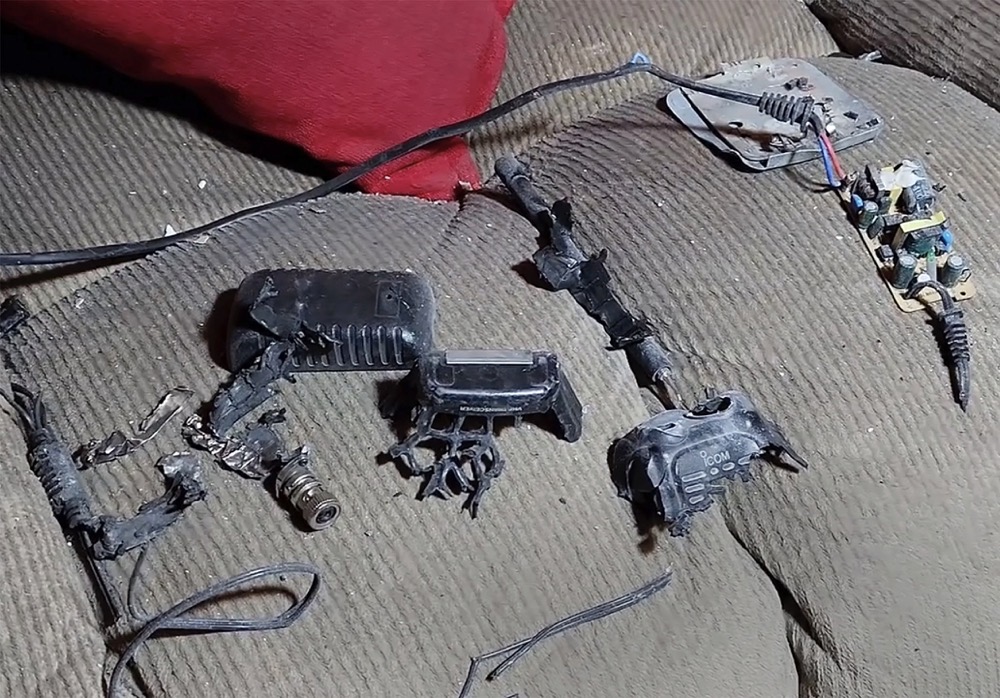
Deadly pager-bomb attacks are widely believed to be carried out by Israel’s spy agency Mossad. (AP)
“My objective is to address existing obstacles and challenges while structuring my country’s foreign relations in cognizance of the necessities and realities of the contemporary world.”
Echoing the words of Iran’s equally new foreign minister, Abbas Araghchi, Pezeshkian indicated that Tehran was keen to reopen the nuclear negotiations from which former US president Donald Trump unexpectedly walked away in 2017.
He also made the case for ending sanctions, “destructive and inhumane weapons … endangering the lives of thousands of innocent people (and) a blatant violation of human rights.”
Iran, he added, “stands prepared to foster meaningful economic, social, political and security partnerships with global powers and its neighbors based on equal footing.”

Faced with Iran’s seemingly conciliatory new president, offering an olive branch at a time when Iran might normally be expected to be reaching for weaponry, experts are divided over whether or not Tehran is truly on a new course and set to defy expectations of its response to events in Lebanon.
“Pezeshkian and Araghchi receive their orders from Ayatollah Khamenei and from the National Security Council in Tehran and they thus don't have a mandate for some sort of a grand change in Iranian policies that would help end its pariah status,” said Arash Azizi, visiting fellow at Boston University’s Frederick S. Pardee Center for the Study of the Longer-Range Future and author of the 2021 book “The Shadow Commander — Soleimani, the US, and Iran's Global Ambitions.”
“But they do have a mandate for lessening tensions, negotiating with the West, including the US, over Iran’s role in Ukraine and its nuclear program, and trying to get to some sort of a rapprochement that could help alleviate pressure on Iran and fix its economy.”
He added: “Any success Iran has in this path will strengthen the pro-reform factions in Iran and affect the trajectory of the country's future, especially a future after Khamenei dies.”
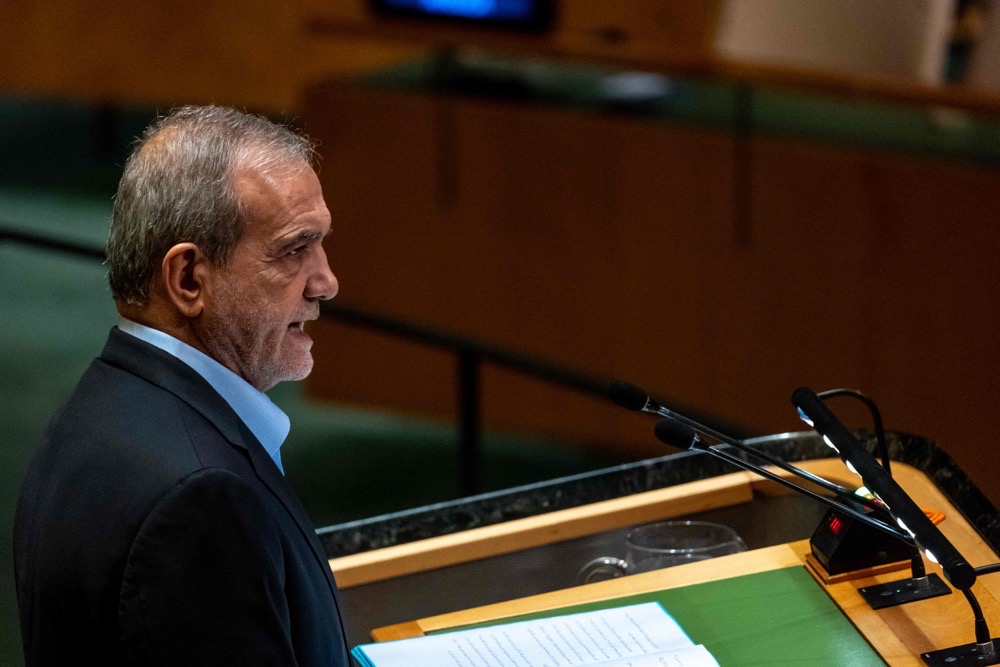
Pezeshkian made the case for restraint directly to Ayatollah Khamenei. (AFP)
Ali Alfoneh, a senior fellow at the Arab Gulf States Institute in Washington and author of the book “Political Succession in The Islamic Republic of Iran,” believes Pezeshkian is uniquely positioned to effect change.
“Iranian President Pezeshkian presides over a cabinet composed of capable technocrats, who also happen to represent different factions among the ruling elites of the Islamic Republic,” he said.
“This rare combination of skills and representation not only provides Pezeshkian with the opportunity to engage in effective diplomacy, but also lessens the risk of domestic factional sabotage of his diplomatic efforts.”
Certainly, when it comes to events in Lebanon, Ali Vaez, Iran Project director with the International Crisis Group, said: “Iran is going to stand behind, not with, Hezbollah. Tehran’s forward defense strategy has always been based on projecting power beyond its borders and deterring, not inviting, strikes against its own territory.”
Opinion
This section contains relevant reference points, placed in (Opinion field)
He added: “Iran seems convinced that expansion of the conflict now will benefit Israel, and it’s following a basic rule that what’s good for Israel can’t be good for Iran.”
Iran, said Sanam Vakil, director of the Middle East North Africa Program at the Royal Institute of International Affairs, was trying to keep two doors open at once.
“It needs to open negotiations with the West to manage its domestic economic crisis, but on regional issues it also needs to keep the Axis of Resistance alive. It’s a hard balance to strike, which is leading to challenges and changes in perception,” he said.
But the reasons behind Iran’s current diplomatic offensive remain “intriguing,” said Ahron Bregman, former Israeli soldier, author and senior teaching fellow in the Department of War Studies at King’s College London, specializing in the Arab-Israeli conflict and the Middle East peace process.

On July 31, Ismail Haniyeh, the head of Hamas’ decision-making Political Bureau, was killed in the heart of Tehran. (AFP)
“Iranian diplomats excel at tightrope walking,” he said.
“Are they trying to end their pariah-state status, or is there a hidden agenda behind their somehow soft diplomatic approach? Does Iran genuinely want to reach an agreement with the West regarding its nuclear ambitions, or is it just trying to kill time?”
Either way, he added: “I believe that Iran doesn’t want to become directly involved in Lebanon, not least because they can see how destructive Israel’s air power is. I’m pretty sure that Iran was taken aback by the ferocity of the Israeli campaign in Lebanon, from the ‘James Bond’ pagers operation to the precise air attacks on Hezbollah’s weapons arsenal.
“But Iran reckons that Israel will struggle if the current campaign in the north turns into a war of attrition with Hezbollah, particularly if Israel invades Lebanon, where it will lose its advantages — the terrain in south Lebanon makes it difficult to use tanks and airpower.”
Urban Coningham, a RUSI research fellow specializing in the security and geopolitics of the Middle East, particularly in the Levant, is skeptical that President Pezeshkian is the face of genuine change.
“I don’t think that we can take this as evidence that Iran is willing to become a reliable security partner and actor in the region,” he said.
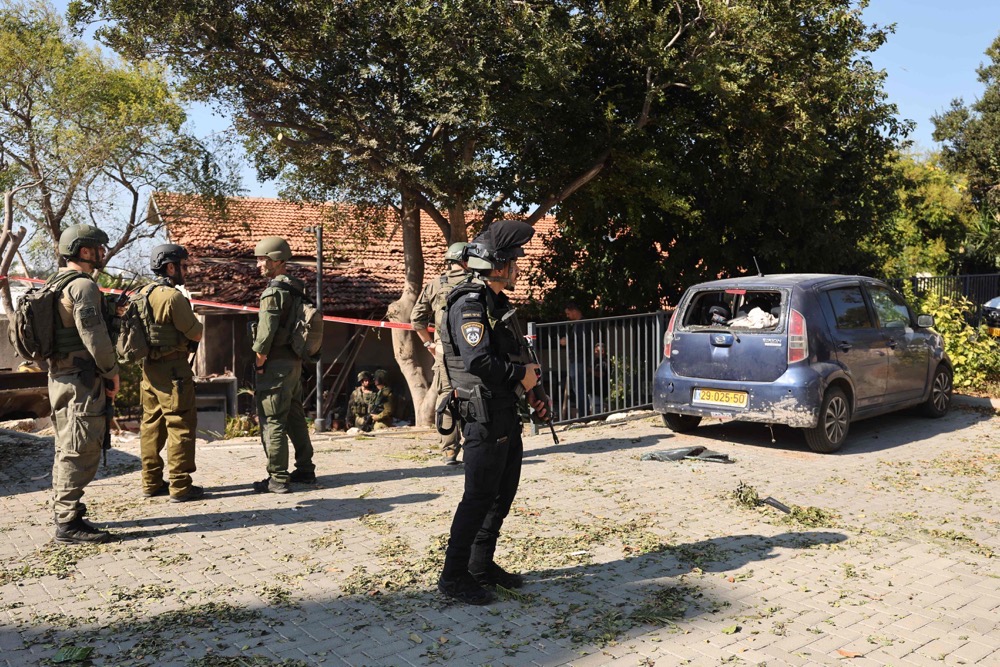
Critics said Netanyahu was poised once again to try to provoke Iran into a regional escalation. (AFP)
“Iran and its Axis of Resistance are in a uniquely weak position as one of their key members, Hezbollah, is under intense attack. Iran’s statement of willingness to come to the negotiation table is really its last tool of applying pressure upon Israel.
“This diplomatic pressure will be applied to Israel’s key allies, principally the US, to persuade Western policymakers that Iran and its network do not pose a threat and to dissuade Israel from continuing to escalate the conflict and isolate Netanyahu.”
Arshin Adib-Moghaddam, professor in Global Thought and Comparative Philosophies at SOAS University of London and author of the book “What is Iran?,” takes a more generous view of Tehran’s current stance.
“By virtue of its historical weight, strategic position and national resources, Iran will always be a central nodal point for the politics of the region and beyond,” he said.
“The reformist administration of President Pezeshkian follows a realistic and largely prudent assessment of this geopolitical centrality, which attempts to harness all the dividends that the power of Persia could bring about.”
In concrete terms, he added, “this approach has seriously restrained Iran’s responses to the onslaught spearheaded by the Netanyahu administration.

“As opposed to the rationale of maximum escalation that Netanyahu pursues with so much brutal desperation, Iran has been recurrently and consistently restrained in its responses, certainly relative to the offensive capabilities that the country possesses.
“Of course, Iran has its right-wing extremists, too. But in contrast to the situation in Israel, they are currently marginalized and the Iranian government around President Pezeshkian is composed of pragmatists and diplomats.”
It was, he added, to be regretted that, as yet, “the world has not taken advantage of this chance for peace, exactly because the Netanyahu administration has plunged the region, and indeed Israelis themselves, into the abyss of a horrendous inferno.”
For now, though, cynicism about Iran’s motives persists among seasoned Western diplomats.
“Iran is playing its usual mind games,” said Sir John Jenkins, a former British ambassador to Saudi Arabia, Iraq and Syria, and consul-general in Jerusalem.
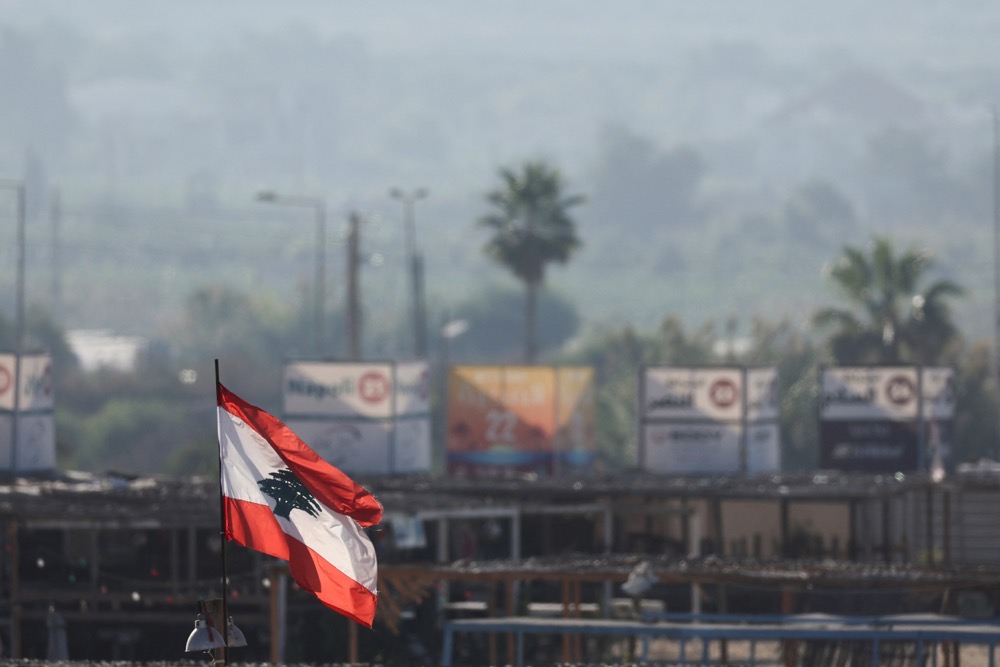
In New York, Pezeshkian spelled it out for anyone who had not already noticed the extent to which Iran has exercised restraint in the face of repeated provocation.
Talk of returning to the nuclear deal, he said, “in the eyes of some makes Iran look reasonable when it’s anything but, so it’s a niche bit of trolling.”
There are, he added, “no signs Tehran will abandon the militias, the Houthis, Hamas, let alone Hezbollah. Iran doesn’t want a hot war with Israel because it believes it can win a war of attrition, so persuading everyone that de-escalation is the answer is a victory in itself.
“If Israel degrades Hezbollah’s capabilities to the extent that it poses no credible threat to Israel, or if it looks as if that is achievable, then Iran may think again. But it wants to avoid the choice. Hence this blackly comic diplomatic farce.”
